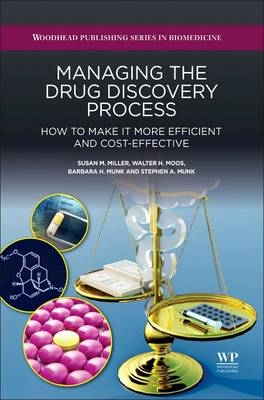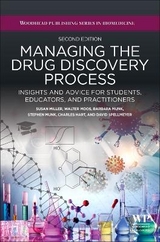
Managing the Drug Discovery Process
Woodhead Publishing Ltd (Verlag)
978-0-08-100625-2 (ISBN)
- Titel erscheint in neuer Auflage
- Artikel merken
This book takes a closer look at increasing pre-approval costs for new drugs and examines not only why these increases occur, but also how they can be overcome to ensure a robust pharmacoeconomic future. Written in an engaging manner and including memorable insights, this book is aimed at redirecting the drug discovery process to make it more efficient and cost-effective in order to achieve the goal of saving countless more lives through science. A valuable and compelling resource, this is a must-read for all students and researchers in academia and the pharmaceutical industry.
Susan M. Miller has been Professor of Pharmaceutical Chemistry in the School of Pharmacy at the University of California San Francisco (UCSF) for over 30 years. Prior to UCSF, she held positions as an Assistant Professor and Lecturer of Biological Chemistry at the University of Michigan, Ann Arbor. Her research focus and expertise lies in the areas of chemical biology and enzymology. Her team uses a variety of biochemical and biophysical tools to investigate protein structure/function questions spanning the range of elucidating novel aspects of catalysis in individual enzymes, to understanding how mutations influence flux through pathways of interacting proteins, to engineering novel microbial compounds using enzymes from ribosomally-synthesized peptide precursor pathways. She has mentored over 40 students, postdocs and staff researchers who currently hold positions in academia, biotech/pharma, the FDA, data science, patent law and other entrepreneurial organizations. She has co-authored and co-edited 5 books and published ~50 peer-reviewed papers. She has served as reviewer for grants at NIH, NSF, DOE and for numerous scientific journals, and is currently a member of the Editorial Review Board at the Journal of Biological Chemistry. Recently, Dr. Miller has served a leading role in the transformative design of the UCSF professional PharmD curriculum. She has co-directed the Therapeutic Sciences portion of the Foundations course and has served as co-Director developing and implementing a novel trio of inquiry elements in the new curriculum. Susan received her B.S. with high honors in Chemistry from the University of Missouri Columbia and her Ph.D. in chemistry with Professor Judith Klinman at the University of California Berkeley. Walter Moos has been an adjunct Professor of Pharmaceutical Chemistry at the University of California San Francisco (UCSF) since 1992. In parallel, he has been Managing Director of Pandect Bioventures, which he co-founded in 2018. At ShangPharma Innovation, starting in 2016 as an advisor, then as CEO, and most recently as emeritus Chairman, he led development of the group's innovation ecosystem. He is past President of Biosciences at the independent nonprofit Stanford Research Institute (SRI International), where he spent more than a decade, until 2016. Moos also managed corporate IT Services at SRI. Earlier he was Chairman/CEO of MitoKor (Micrologics/Migenix) and a VP at Chiron (Novartis) and at Warner-Lambert/Parke-Davis (Pfizer). He and his teams have made significant contributions to all R&D phases from early-stage research on chemical and biological therapeutics and diagnostics to marketed pharmaceutical products. They have done this with the support of big pharma, foundations, government grants and contracts, and venture capital. Moos has served on more than 20 business and scientific boards, public and private, non-profit and for-profit, including Alnis, Amunix (Sanofi), Anterion, Aprinoia, Axiom (Sequenom), the Biotechnology Industry (Innovation) Organization (BIO), Circle, the Critical Path Institute, Global Blood (Pfizer), Keystone Symposia, Mimotopes (Fisher/Thermo), MitoKor (Micrologics/Migenix), Oncologic (Aduro/Chinook), Onyx (Amgen), Rigel, ShangPharma Innovation, Valitor, and the Virginia University Research Partnership. He has advised companies on several continents and served as a committee member for academic, government, and investor groups, including the US National Academy of Sciences. He has co-founded several scientific journals, co-authored or edited multiple books, and has around 200 patents and publications. Moos has held faculty positions at several major universities and received PhD and AB degrees in chemistry from UC Berkeley and Harvard, respectively. Barbara H. Munk is currently a Clinical Assistant Professor and Associate Director for Operations in the School of Molecular Sciences at Arizona State University. Before coming back to Arizona State University, she was a Senior Lecturer in the Chemistry Department at Wayne State University (Detroit, Michigan) where she was responsible for teaching general and analytical chemistry to undergraduate chemistry majors and students in the preparatory programs for health care professions. Barbara also served as Chair of the Chemistry Department Safety Committee and was responsible for coordinating communications between various University departments in order to comply with current regulations and help ensure a safe environment for undergraduate teaching and graduate student research laboratories. Prior to joining the faculty at Wayne State University, Barbara worked as a research chemist and as a manager with a diverse set of industrial companies including Warner-Lambert/Pfizer, Allergan Pharmaceuticals, the Clorox Company, Great Lakes Chemical Corporation, the Stepan Company, and Port Systems, LLC (a start-up company in Ann Arbor, MI). During her 25 years in industry, she has been involved in research and development activities from phase I through phase III and the ultimate filing of New Drug Applications. While at the University of California at Irvine, Barbara was involved with the development of UC-ACCESS, an early online system designed to help academic scientists find industrial partners with whom to develop emerging technologies. Her chemical research efforts are summarized in a number of publications and patents. She is co-author of a book describing the drug development process and co-editor of a laboratory manual for undergraduate general chemistry. Barbara holds a Ph.D. in Chemistry from Wayne State University, a M.S. in Management from Purdue University and a B.S. in Chemistry from Arizona State University. Dr. Stephen Munk joined the Biodesign Institute at Arizona State University (ASU) as its Deputy Director in October of 2017 and is a Professor of Practice in the School of Molecular Sciences. Steve is involved in strategic planning for the Institute, identifying new programs, grant funding and commercialization opportunities. He was elected a Senior Member of the National Academy of Inventors in 2022. His work is summarized in a number of publications and patents. Prior to joining ASU, Steve was in the pharmaceutical industry for 25 years in a variety of scientific and managerial positions including drug design and discovery as well as drug development and manufacturing. Steve served as the CEO and President of Ash Stevens Inc., a full service Active Pharmaceutical Ingredient (API) development and manufacturing organization. Under his leadership, Ash Stevens received twelve FDA approvals to manufacture innovator drug substances. These approvals include the oncology drugs bortezomib (Velcade®), busulfan (Busulfex®), clofarabine (Clolar®), 5-azacitidine (Vidaza®), ponatinib (Iclusig®) and ixazomib (Ninlaro®). Prior to joining Ash Stevens in 1997, he worked at Allergan, Inc. as a medicinal chemist and subsequently, the co-team leader of the adrenergic drug discovery team responsible for commercializing Alphagan® to treat glaucoma. He received his B.S. in chemistry at Arizona State University, and then earned his Ph.D. in organic synthesis at The University of California at Berkeley with Henry Rapoport and subsequently completed an American Cancer Society Postdoctoral Fellowship with Dale Boger at Purdue conducting studies involved in the sequence selective interaction of small molecules with DNA using the tools of molecular biology. Dr. Munk served as an Adjunct Associate Professor of Chemistry at Wayne State University and on the Henry Ford Community College Biotechnology Advisory Board. He served on the Steering Committee of the Chemistry in Cancer Research Working Group of the American Association for Cancer Research (CICR-AACR; 2008-2010; 2011-2013; Chairman, 2014), the Board of Directors of MichBio (2008 – 2014; Chairman 2010 - 2014), the Michigan Biotechnology Innovation Organization (BIO) affiliate and is currently on the Board of Directors of AZBio, the Arizona Biotechnology Innovation Organization (BIO) affiliate.
Section A: Introduction and Overview
1: Backgrounder: Medicinal chemistry: Research, discovery, art, science
Section B: Preprofessional Education
2: Introduction: Preprofessional education
3: Two-year certification and degree programs
4: Four-year undergraduate degree programs
5: The big decision
Section C: Graduate and Professional Education
6: Graduate and postgraduate education at a crossroads
7: Master’s degree programs
8: Doctoral and professional programs
9: The big leap
Section D: Research and Discovery
10: Drug discovery: Chaos can be your friend or your enemy
11: Drug discovery: Standing on the shoulders of giants
12: Research and discovery: The difficult we do immediately—The impossible takes only a little longer
Section E: Chemical Development, Quality Requirements, and Regulatory Affairs
13: Turning a potent agent into a registered product
14: Chemical development: Synthetic studies and engineering aspects
15: Chemical development: Analytical studies
16: FDA path and process: Sponsor‘s regulatory tasks for drug approval
Section F: Pharmaceutical Research and Development: Concluding Remarks
17: Epilogue
| Erscheinungsdatum | 26.11.2016 |
|---|---|
| Verlagsort | Cambridge |
| Sprache | englisch |
| Maße | 152 x 229 mm |
| Gewicht | 860 g |
| Themenwelt | Medizin / Pharmazie ► Medizinische Fachgebiete ► Pharmakologie / Pharmakotherapie |
| Medizin / Pharmazie ► Pharmazie | |
| Technik | |
| ISBN-10 | 0-08-100625-X / 008100625X |
| ISBN-13 | 978-0-08-100625-2 / 9780081006252 |
| Zustand | Neuware |
| Informationen gemäß Produktsicherheitsverordnung (GPSR) | |
| Haben Sie eine Frage zum Produkt? |
aus dem Bereich



